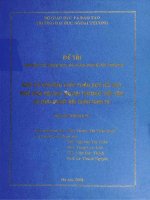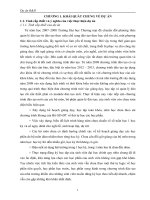Group 12 IIAs PROMINENT TRENDS
Bạn đang xem bản rút gọn của tài liệu. Xem và tải ngay bản đầy đủ của tài liệu tại đây (876.48 KB, 52 trang )
IIAs
PROMINENT TRENDS
GROUP 12
Trần Thiên Long (Leader)
Mai Hữu Lộc
Nguyễn Hữu Lợi
Hạ Thiên Long
Hoàng Minh Long
Huỳnh Thị Vân Long
Nguyễn Vũ Long
INTRODUCTION
Volume trend of IIAs
Source: UNCTAD World Investment Report 2020
2019 IIAs
3 284
+34
>
+22
New treaty conclusions
Effective treaty terminations
TOTAL IIAS
Evolution of
the IIA
regime
Source: UNCTAD’s REFORM PACKAGE FOR THE INVESTMENT REGIME INTERNATIONAL
IIAs in a changing context
A new sustainable development paradigm
IIAs can no longer be designed in isolation, but need to be harmonized
with, and made conducive to, the broader goal of sustainable
development
A new investor landscape
Emerging economies are increasingly large sources of
investment themselves
The greater role of governments in the economy
Stronger role for State regulation manifests itself with regard to
sustainable development
UNCTAD’s Road Map for IIA Reform:
Five priority areas of reform
Source: UNCTAD’s REFORM PACKAGE FOR THE INVESTMENT REGIME INTERNATIONAL
OUTLINE
PRESERVATION OF
01.
STATES’ REGULATORY
03.
DISPUTE SETTLEMENT
SPACE
02.
SUSTAINABLE
DEVELOPMENT TRENDS
INVESTOR-STATE
INVESTMENT
04.
PROMOTION AND/OR
FACILITATION
IIAs concluded in
2018
2019
General exceptions, e.g. for the protection of human, animal or plant life or health
66.67%
60%
Refined definition of investment
93.33%
80%
100%
93.33%
80%
93.33%
100%
100%
Omission of the so-called “umbrella” clause
96.67%
86.67%
References to the protection of health and safety, labour rights, environment or sustainable development in
86.67%
73.33%
56.67%
26.67%
46.67%
53.33%
Limiting access to ISDS
80%
93.33%
Specific proactive provisions on investment promotion and/or facilitation
90%
80%
Circumscribed FET, or FET omitted
1
Clarification of indirect expropriation, or indirect expropriation omitted
Detailed exceptions from the free-transfer-of-funds obligation
the treaty preamble
2
Explicit recognition that parties should not relax health, safety or environmental standards to attract
investment
Promotion of corporate and social responsibility standards
3
4
UNCTAD World Investment Report
IIAs concluded in
Reform-oriented provisions
PRESERVATION OF STATES’
REGULATORY SPACE
General exception included in
IIAs
According to Article 4.6 of EVIPA: General Exception
Subject to the requirement that such measures are not applied in a manner which would constitute a means of arbitrary or unjustifiable discrimination between countries where like
conditions prevail, or a disguised restriction on covered investment, nothing in Articles 2.3 (NT) and 2.4 (MFNT) shall be construed as preventing the adoption or enforcement by
any Party of measures:
(a) necessary to protect public security or public morals or to maintain public order;
(b) necessary to protect human, animal or plant life or health;
(c)
relating to the conservation of exhaustible natural resources if such measures are applied in conjunction with restrictions on domestic investors or on the domestic supply or
consumption of services;
(d) necessary for the protection of national treasures of artistic, historic or archaeological value;
(e) necessary to secure compliance with laws or regulations which are not inconsistent with Articles 2.3 (National Treatment) and 2.4 (Most-Favoured-Nation Treatment) including those
relating to:
(•) (i) the prevention of deceptive and fraudulent practices or to deal with the effects of a default on contracts;
(•) (ii) the protection of the privacy of individuals in relation to the processing and dissemination of personal data and the protection of confidentiality of individual records and accounts; or
(•) (iii) safety;
f)
inconsistent with paragraph 1 of Article 2.3 (National Treatment) provided that the difference in treatment is aimed at ensuring the effective or equitable imposition or collection of direct
taxes in respect of economic activities or investors of the other Party .
The impact
●
Provide a balance between the claim of foreign investment
protection and the protection of other values or objectives
=> the basis for the countries concerned to proceed actions
towards investors
LIMITATIONS TO THE TREATY
SCOPE
Limitations to the treaty scope
According to Article 2.1(2) of EVIPA: Scope
Articles 2.3 (National Treatment) and 2.4 (Most-Favoured-Nation Treatment) do not apply to:
a) audio-visual services;
b) mining, manufacturing and processing of nuclear materials;
c) production of or trade in arms, munitions and war material;
d) national maritime cabotage;
e) domestic and international air transport services, whether scheduled or non-scheduled, and services directly related to the exercise of traffic rights,
other than:
(i) aircraft repair and maintenance services during which an aircraft is withdrawn from service;
(ii) the selling and marketing of air transport services;
(iii) computer reservation system services;
(iv) ground handling services; and
(v) airport operation services;
g) services supplied and activities performed in the exercise of governmental authority.
The impact
●
Clarify the obligations of each party
●
Leave more space for host country to regulate their own policies in some
important sectors
CIRCUMSCRIBED FET
CIRCUMSCRIBING THE FET OBLIGATION
According to Article 2.5(2) of EVIPA:
“A Party breaches the obligation of fair and equitable treatment referred to in paragraph 1 where a measure or series of
measures constitutes:
●
●
●
●
●
●
(a) A denial of justice in criminal, civil, or administrative proceedings;
(b) A fundamental breach of due process in judicial and administrative proceedings;
(c) manifest arbitrariness;
(d) targeted discrimination or manifestly wrongful grounds, such as gender, race, or religious belief;
(e) abusive treatment such as coercion, abuse of power, or similar bad faith conduct;
(f) a breach of any further elements of the fair and equitable treatment obligation adopted by Parties in accordance with paragraph
3.”
THE IMPACTS
Preserving “the right to regulate of the host
country”
Reducing the risk of misinterpretation
CLARIFYING AND OMITTING INDIRECT EXPROPRIATION
According to Article 2.7 of EVIPA:
“A party shall not nationalize or expropriate the covered investments of investors of the other Party either directly, or
indirectly through measures having an effect equivalent to nationalization or expropriation (hereinafter referred to as
“expropriation”), except:
●
●
●
●
(a) for a public purpose;
(b) under due process of law;
(c) on a non-discriminatory basis;
(d) against payment of prompt, adequate, and effective compensation.”
“
“ Indirect expropriation occurs if a measure or series of measures by a
Party has an effect equivalent to direct expropriation in that it
substantially deprives the investor of the fundamental attributes of
property in its investment including the right to use, enjoy and dispose of
its investment, without formal transfer of title or outright seizure.”
According to Annex 4.1 (b) of EVIPA
THE IMPACTS
Protection for investors against
Creating more safer environment for
repurcurssion
investors
DETAILED EXCEPTIONS FROM THE
FREE-TRANSFER-OF-FUNDS OBLIGATION
“
“ In exceptional circumstances of serious difficulties for the operation of the Union’s
economic and monetary union, or, in the case of Viet Nam, for the operation of monetary
and exchange rate policy, or a threat thereof, the Party concerned may take safeguard
measure that is strictly necessary with regard to transfer for a period not exceeding one
year..”
According to Article 4.10 of EVIPA









